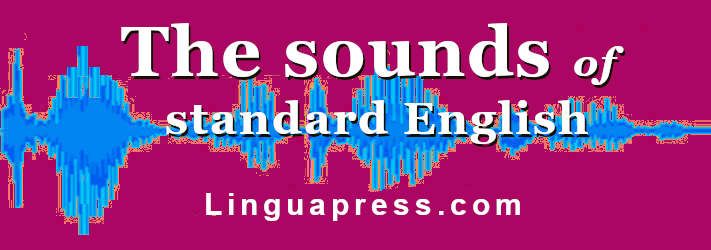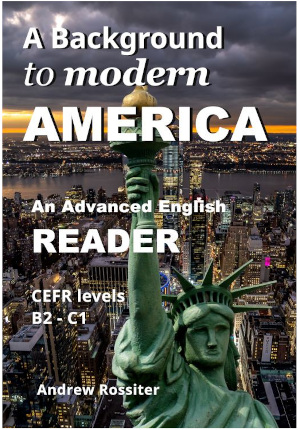The sounds of English
A simple introduction to English phonetics
[ə 'sɪmpl ɪntrə'dʌkʃn tu 'ɪŋglɪʃ fə'netɪks]

This
page looks at the sounds of "standard" British English, also
known as the King's
English, RP or Oxford
English. There are many other
varieties of spoken English which may be accents or dialects, and are
pronounced with variations of some sounds.
1. Phonetics - the sounds of words
One of the problems with learning to speak English is that some letters, for example "c"CLEAR, CONCISE
and COMPREHENSIVE
See grammar in a new light From
Amazon,
Barnes & Noble, Waterstones and good bookshops
From
Amazon,
Barnes & Noble, Waterstones and good bookshops
are pronounced
differently in different words. We say
"cat",
but we say "cell", the same
letter "c" in
writing, but two different
sounds, [k] in cat, and [s] in cell.
So to
represent sounds as they are spoken, we can write not in normal words,
but using
a "phonetic alphabet", which has more than the normal 26
letters of the written English alphabet. When we write words
using a phonetic
alphabet, we put them between square brackets [....].
See grammar in a new light
 From
Amazon,
Barnes & Noble, Waterstones and good bookshops
From
Amazon,
Barnes & Noble, Waterstones and good bookshopsPhonetic alphabets use one symbol for each sound. Most of these symbols, such as [b], [s] and [m] are easy to understand; a few others, such as [ θ ] as in "thick" or [ ʊə ] as in "sure" need to be learned.... but this is not very difficult.
There are a few different phonetic alphabets, but the most frequently used set of phonetic letters is the "IPA".... which in this case means the International Phonetic Alphabet.
1.1. Consonants
Consonants are sounds that are not usually used on their own. We can't say "b"... well we could say "b" but it has no meaning, just like the sounds "k" or "n". The good thing about consonants is that they tend to be the same from one type of English to another, and even fairly similar from one language to another. English has consonants that some other languages do not have, such as [ ð ] or [ ŋ ] ... but generally speaking even consonants like [ ð ] are the same in different accents of English - though in some accents people may say [ d ] instead of [ ð ].
There are three basic groups of consonants, 1. plosives or occlusives, 2. fricatives or sybillants and affricatives, 3. liquids, semivowels and nasals. We will not concern ourselves here with the subcategories of these groups.
Group 1 - Plosives
Plosive and fricative consonants can be either unvoiced (voiceless) as in [t], or voiced, as in [d]. We do not use our vocal cords to produce unvoiced or voiceless consonants. Standard English has six plosive consonants:
| Voiceless | examples | Voiced | examples |
|---|---|---|---|
| p | put = [pʊt] skip = [skɪp] | b | big [bɪg] grab [græb] |
| t | tent = [tent] tiny = [tainɪ] | d | duck [dʌk] would [wʊd] |
| k | cat [kæt] pick [pɪk] | g | go [goʊ] flag [flæg] |
Group 2 - Fricatives and affricatives
There are eleven consonants in this group.
| Voiceless | examples | Voiced | examples |
|---|---|---|---|
| h | hit = [hɪt] inhale [ɪn'heil] | ||
| f | fit = [fɪt] stuff = [stʌf] | v | van [væn] live [liv] |
| θ | thick = [θɪk] path = [pa:θ] | ð | then [ðen] with [wɪð] |
| s | sat [sæt] Miss [mɪs] | z | goes [goʊz] flags [flægz] |
| ʃ | shall [ʃæl] wish [wɪʃ] | ʒ | beige [beiʒ] |
| tʃ | chip [tʃɪp] which [wɪtʃ] | dʒ | jog [dʒɒg] badge [bædʒ] |
Fricative sounds occur when air through the mouth is restricted by lips teeth or tongue. The affricative consonants [tʃ] and [dʒ] combine a plosive and a fricative sound.
Group 3 - Liquids, semivowels and nasals
The liquid consonants are [l] and [r], the semivowels are [w] and [ j ] , which are generally found at the start of words or before vowels; the nasal consonants are [n] [m] and [ ŋ ].
| Sound |
examples |
|---|---|
| l | lit = [lɪt] will = [wɪl] |
| r | red = [red] sorry = [sorɪ] |
| w | what [wɒt] |
| j | you [ju:] refuse [rɪ'fju:z] |
| n | net [net] can [kæn] |
| m | met [met] come [kʌm] |
| ŋ | sing [sɪŋ] singing ['sɪŋɪŋ] finger ['fɪŋgə] |
1.2. Vowels
Standard English speakers use two kinds of vowel, simple vowels and diphthongs. Simple vowels consist of a single vowel sound, and can be short, as in "cat" [kaet] or long as in "cart" [kɑ:t]. Diphhongs are a combination of two vowel sounds, as in "wait" [weit] or "side" [said]. They are not two distinct vowels, but a slide from one vowel to another: [said], not [sa-id]Group 4 - Simple vowels (monophthongs)
Different dictionaries and textbooks use slightly different phonetic symbols for some vowels, in particular for long vowels. Sometimes long vowels are designated with a colon (:) after the symbol. Using the colon makes it easier for learners to quickly see if a vowel is short or long.
| Short | examples | Long | examples |
|---|---|---|---|
| æ | cat [kæt] | ɑ or ɑ: | cart [kɑt] or [kɑ:t] |
| e | bed [bed] | ||
| ɪ | ship [ʃɪp] | i or i: | sheep [ʃi:p] |
| ɒ | shot [ʃɒt] | ɔ or ɔ: | short [ʃɔ:t ] |
| ʊ | pull [pʊl], push [pʊʃ] | u or u: | pool [pu:l], few [fju:] |
| ʌ | duck [dʌk], mother ['mʌðə] | ||
| ə | away [ə'wei], brother ['brʌðə] | ɜ or ə: | bird [bə:d] or [bɜd] first [fə:st] |
The last short vowel in this list, which we call the "schwa" [ə], is the most common vowel in English, and is used in a large number of unstressed words and syllables, as in the example above, away [ə'wei], where the first syllable is unstressed. It is the vowel most often used for words such as the articles "a" [ə] and "the" [ðə] (we only pronounce these words as [ei] and [ði:] in specific cases).
Group 5 - Diphthongs in standard English.
In most cases, diphthongs are used in stressed syllables
| Sound |
Examples |
|---|---|
| ai | light = [lait] while = [wail] |
| ei | made = [meid] display = [dis'plei] |
| ɔɪ | boy [bɔɪ] join [dʒɔɪn] |
| əʊ | note [nəʊt] go [gəʊ] |
| aʊ | shout [ʃaʊt] confound [kən'faʊnd] |
| ɪə | dear [dɪə] period ['pɪərɪəd] |
| eə | fair [feə] compare [kəm'peə] |
| ʊə | poor [pʊə] pure [pjʊə] |
2 More examples.
Note four final points:- Phonetic transcription does not use normal punctuation nor capital letters at the start of words.
- The stressed syllables of words with two syllables or more are preceded by an apostrophe (') .
- The pronunciation of words, paticularly short words such as "you" or "the", may vary according to their place in the sentence.
- When we speak, we do not generally pause between words; the spaces used in phonetic transcription are essentially there to relate the spoken text to the words that are being used.
| Normal
writing |
phonetic transcription |
|---|---|
| He lives in a big house in London | hi: lɪvz ɪn ə bɪg haus ɪn 'lʌndən |
| Where's my computer gone ? | weəz mai kəm'pjutə gɒn |
| I asked you to put it in the shed, not in the shade! | ai ɑ:skt ju: tə pʊt it ɪn ðə ʃed nɒt ɪn ðə ʃeid (or ai ɑ:st ju:..... ) |
| You should eat a good breakfast before you go to school! | ju: ʃʊd i:t ə gʊd 'brekfəst bɪfɔ: jʊ gəʊ tə sku:l |
| The chairman will introduce the invited speakers at the start of the conference | ðə 'tʃeərmən wəl ɪntrə'dju:s ði: ɪn'vaitɪd 'spi:kəs ət ðə stɑ:t əv ðə 'kɒnfrəns |
| You're joking ? | jɔ: 'dʒəʊkɪŋ OR jʊə 'dʒəʊkɪŋ |
| There are fewer and fewer visitors each year, aren't there? | ðeər ə fjʊər ən fjʊə 'vɪzɪtəz i:tʃ yə: ɑ:nt ðeə |
| I think I've broken my thumb ! | ai θɪŋk aiv brəʊkn mai θʌm |
► For more on the sound of spoken English, go to word stress in English on Linguapress.com


 Copyright
information.
Copyright
information.